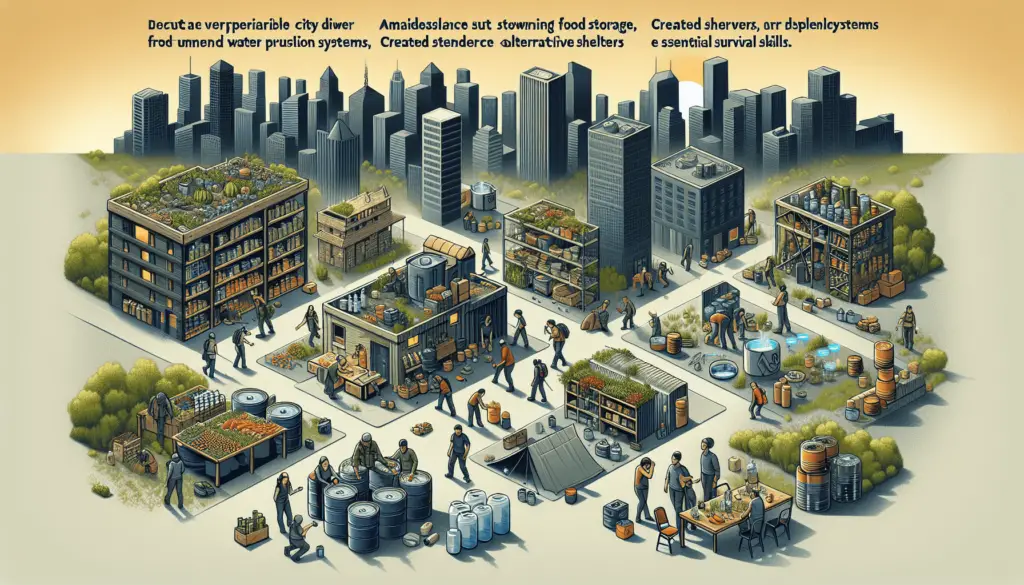Living in a bustling city has its perks, but it also comes with its fair share of challenges. In an ever-changing world, it’s important to be prepared for the unexpected, even in the concrete jungle. “Urban Prepping: Survival Strategies for City Dwellers” provides practical advice and tips on how to navigate potential emergencies and keep yourself and your loved ones safe in an urban environment. From creating a disaster plan tailored to the unique challenges of city life to stocking up on essential supplies, this article will arm you with the knowledge and tools needed to face any situation with confidence. Whether it’s a power outage, natural disaster, or unforeseen crisis, urban prepping is not just a trend, but a necessary skill set for city dwellers today.
Emergency Communication
In any emergency situation, communication is crucial. Having reliable communication tools can help keep you connected with loved ones and emergency services. Two-way radios are a great option as they do not rely on cellular networks. With a two-way radio, you can communicate with others who have radios within a specific range. This can be incredibly useful in situations where cell phone service is down or unreliable.
Cell phone signal boosters are another essential tool for emergency communication. These devices amplify weak cell signals, allowing you to make and receive calls even in areas with poor reception. In times of disaster, when cell towers may be overwhelmed or damaged, a signal booster can significantly improve your chances of reaching out for help.
Emergency whistles should also be included in your emergency communication kit. They are a simple yet effective way to alert others of your presence. Whether you find yourself trapped in a collapsed building or lost in a crowded urban area, a whistle can attract the attention of rescue teams or passersby, increasing your chances of being found quickly.
Water Supply
Access to clean water is essential for survival. In an emergency situation, the water supply may become contaminated or cut off entirely. Water purification tablets are compact and easy to carry, making them a reliable option for treating water on-the-go. These tablets quickly disinfect water, making it safe for drinking.
Portable water filters are another excellent choice for ensuring access to clean water. These devices remove impurities and bacteria from water sources, allowing you to drink safely. With advanced filtration technology, portable water filters can turn even the dirtiest water into a potable source.
Collapsible water storage containers are practical for storing and transporting water. These containers are lightweight and compact when empty, but can expand to hold a significant amount of water. Having a few collapsible water storage containers on hand can ensure you have an adequate supply of water in case of an emergency.

Food Storage
During an emergency, having a reliable food supply is vital. Canned foods with a long shelf life are an excellent option for urban preppers. These foods are typically non-perishable, meaning they can be stored for an extended period without spoiling. Look for canned goods that provide a balance of nutrients to sustain you in any situation.
Dehydrated meals are another popular choice among preppers. These meals are lightweight, easy to prepare, and have a long shelf life. Dehydrated meals often come in individual packages, making them convenient for portion control and easy storage. Just add water, and you’ll have a nutritious meal in no time.
Investing in durable food containers is essential for proper food storage. These containers keep your food safe from pests, moisture, and other contaminants. Look for airtight containers that are labeled food-safe and stackable, as this will maximize your storage space.
First Aid
Having a well-stocked first aid kit is crucial for handling injuries and medical emergencies during a disaster. A basic first aid kit should include items such as adhesive bandages, antiseptic wipes, gauze pads, adhesive tape, and scissors. These supplies can help manage minor wounds and injuries effectively.
In addition to a basic first aid kit, consider adding specific medical supplies that may be relevant to your personal needs or any pre-existing medical conditions. This could include medications for chronic illnesses, EpiPens for severe allergies, or insulin for diabetic individuals. Consult with your healthcare provider to ensure you have the necessary supplies and medications in case of an emergency.
Prescription medications should also be included in your emergency preparedness plan. Ensure you have an ample supply of any prescription medications you or your family members require. Keep track of expiration dates and rotate medications when necessary to ensure their effectiveness.

Emergency Lighting
When the power goes out during an emergency, having a reliable source of light is essential. LED flashlights are a popular choice due to their energy efficiency and long battery life. These flashlights can provide bright illumination for an extended period, ensuring you can navigate dark areas safely.
Glow sticks are another option for emergency lighting. These small, lightweight sticks are activated by bending and shaking, emitting a steady glow that can last for hours. They are a safe and easy-to-use lighting solution, perfect for keeping in your emergency kit or attaching to your clothing or backpack for visibility.
Solar-powered lanterns are an excellent long-term lighting solution. These lanterns harness solar energy during the day and provide hours of illumination at night. They are environmentally friendly and do not require batteries, making them a sustainable choice for emergency lighting.
Self-Defense
In uncertain or dangerous situations, it’s important to prioritize your personal safety. Pepper spray is a non-lethal self-defense option that can temporarily incapacitate attackers, giving you time to escape or seek help. It is compact and easy to carry, allowing you to have it readily available when needed.
Personal alarms are another effective deterrent for potential attackers. These small devices emit a loud, piercing sound when activated, attracting attention and potentially scaring off assailants. Personal alarms are typically compact and can easily fit on a keychain or in a pocket, so you can have them with you at all times.
Tactical flashlights serve a dual purpose as both a light source and a self-defense tool. These flashlights are designed to be durable and have enhanced features like a strobe mode or a beveled edge that can be used for striking. In a situation where you need to protect yourself, a tactical flashlight can provide both light and a means of defense.
Tool Kit
Having a well-equipped tool kit is essential for urban preppers. A multi-tool is a compact and versatile tool that combines several functions into one convenient device. With features like pliers, screwdrivers, knives, and more, a multi-tool can help you tackle a variety of tasks in an emergency situation.
Duct tape is a versatile and durable adhesive that should be included in any emergency tool kit. It can be used for a wide range of purposes, including temporary repairs, securing objects together, or creating makeshift solutions. Duct tape is strong and resilient, making it incredibly useful in emergency situations.
An emergency hammer is an essential tool for breaking windows or glass in case of an emergency evacuation. This specialized hammer often has a pointed metal tip designed to shatter glass easily. It can be a lifesaver if you find yourself trapped inside a car or building and need to escape quickly.
Emergency Shelter
In some emergency situations, you may need to find temporary shelter until help arrives or the situation improves. Emergency blankets, also known as space blankets, are lightweight and compact. They are made of heat-reflective material and can help retain body heat in cold environments. These blankets are an excellent addition to your emergency kit and can provide warmth and protection from the elements.
Tarpaulins, or tarps, are durable and versatile tools for creating temporary shelter. They can be used to create a makeshift roof, protect yourself from rain or wind, or as a ground cover to keep you dry. Look for tarps made of waterproof and tear-resistant material for maximum durability.
Portable tents are another option for emergency shelter. These tents are designed to be lightweight and easy to set up, making them ideal for temporary accommodation. Look for tents that are waterproof and provide adequate ventilation to ensure your comfort and safety.
Emergency Cash
During an emergency, access to cash may become limited, making it essential to have some emergency cash on hand. Small denomination bills are recommended to provide flexibility and make transactions easier if banks or ATMs are unavailable. Keep a reasonable amount of cash in a secure location where it is easily accessible but not easily discovered.
Coins should also be included in your emergency cash supply. While coins may not hold significant purchasing power, they can be useful for small transactions or when exact change is needed. Having a variety of coins can be beneficial in situations where cash transactions are required.
An emergency credit card can provide an additional safety net during an emergency. Keep a designated credit card reserved for emergencies only, ensuring that it has a sufficient credit limit to cover unexpected expenses. This card should be separate from your regular credit cards to avoid any confusion or unintentional use.
Sanitation
Maintaining proper sanitation and hygiene is crucial during an emergency to prevent the spread of disease and infection. Hand sanitizer should be included in your emergency kit to ensure you have access to clean hands when soap and water are not available. Look for hand sanitizers with at least 60% alcohol content for maximum effectiveness.
Toilet paper is a basic necessity that should be included in your emergency supplies. Stock up on enough toilet paper to last for an extended period. In an emergency situation, toilet paper may become scarce or unavailable, so having an ample supply is crucial for personal hygiene.
Disposable gloves are essential for protecting yourself from contamination when handling potentially hazardous materials. They provide a barrier between your skin and harmful substances, reducing the risk of infection or injury. Keep a box of disposable gloves in your emergency kit to ensure you can maintain proper hygiene and stay safe.
As a city dweller, being prepared for emergencies is essential for your safety and well-being. By having the right tools and supplies on hand, you can confidently navigate through challenging situations and protect yourself and your loved ones. Remember to regularly check and update your emergency kit to ensure that all items are in good condition and within their expiration dates. Stay prepared, stay safe, and be ready to face any urban emergency that comes your way.
